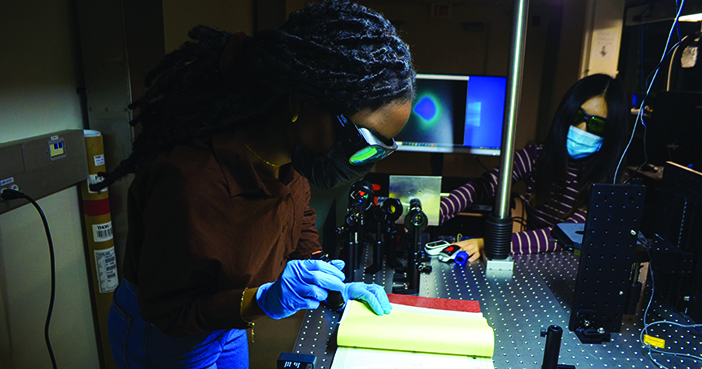Accelerator fund advances the commercialization of faculty projects with potential to improve research and patient care.
Three emerging technologies each received $100,000 this year through the Brown Biomedical Innovations to Impact accelerator fund.
Launched five years ago, BBII supports the development of faculty discoveries into products with clinical impact, such as drugs, medical devices, and tests. Inventors submit their project proposals to an advisory committee, which reviews them for commercialization potential. This year, the three funded proposals were whittled down from 16, all brought forward by teams led by hospital- or campus-based faculty.
Interdisciplinarity is often a key feature of winning teams, says Karen Bulock, PhD, the managing director of BBII.
“When we have someone with more of a clinical background, and someone on campus with basic science or even engineering, some of those collaborations are some of the most interesting things we’ve seen, because of that breadth of expertise that’s all still internal to Brown,” Bulock says.
The proposals selected this year are an app that tracks and helps treat chronic pain—the first digital therapeutic BBII has funded, Bulock says; a device that aims to correct skin color bias in blood oxygen level testing; and a method to isolate single tumor cells for better diagnosis and, potentially, treatment.
- Frederike Petzschner, PhD, an assistant professor of brain science (research), developed SOMA, an app that tracks and monitors pain symptoms, treatments, and daily activities to help researchers better predict which patients’ pain will become chronic. Research suggests that chronic pain may be a manifestation of learned pain, which is maintained by beliefs centered around fear, harm, and a lack of control. With her BBII funding, Petzschner will create a mind-body intervention that will be delivered through the app and can be used either on its own or alongside back pain treatments, and will be tested in a clinical trial.
- Kimani Toussaint, PhD, the Thomas J. Watson, Sr. Professor of Science, is developing a novel optical technique to accurately measure blood oxygen saturation levels, regardless of skin color. Conventional pulse oximeters, which shine light through the skin to estimate the amount of oxygen in a person’s blood, tend to overestimate blood oxygen for people with dark skin—meaning someone with dangerously low blood oxygen levels could receive a reading that appears perfectly normal. Toussaint, who is also the senior associate dean for research and strategic initiatives for Brown’s School of Engineering, and his team will use its BBII funding to optimize the wavelength and polarization of light in a prototype device to be tested in a clinical trial.
- Anubhav Tripathi, PhD, professor of engineering and the director of biomedical engineering; and Nikos Tapinos, MD, PhD, the Sidney A. Fox and Dorothea Doctors Fox Associate Professor of Ophthalmology, Visual Science, and Neuroscience, devised a new method, using electric fields, to isolate single cells from complex tissues, such as tumors. Their approach keeps cells intact, allowing for faster and more accurate cancer diagnosis; it also has applications in tissue engineering and cell culture. The Steven J. Massarsky Charitable Trust provided the funding for this award; Tripathi and Tapinos will use it to further develop a device that will allow the user to simply load the tissue, press a button, and obtain a sample ready for single-cell analysis.
Since 2018, BBII—which is managed by the Division of Biology and Medicine in collaboration with Brown Technology Innovations—has funded 21 proposals by 19 faculty, totaling $2.1 million. Of those, four startups have formed to commercialize their BBII-funded products—and have raised a combined $3 million in additional seed funding, Bulock says. One of those companies is XM Therapeutics, which won a BBII award in 2019. Founder Jeffrey Morgan, PhD, the Donna Weiss ’89 and Jason Weiss Director of the Center for Alternatives to Animals in Testing, invented a technology that generates biomaterials from cultured human cells to aid patient recovery from heart failure.
Another startup, 2020 BBII awardee PedialyDx, was cofounded by Barry Lester, PhD, director of the Brown Center for the Study of Children at Risk; and Stephen Sheinkopf, PhD, a former associate professor of pediatrics and of psychiatry and human behavior. They are using machine learning to develop and commercialize diagnostic tools based on acoustic signatures from infants’ cries.
Last year, SmölTap became the first BBII awardee to bring its technology to market. The device, which stabilizes infants to perform a lumbar puncture (spinal tap), was invented by Brian Alverson, MD, a former professor of pediatrics and of medical science, and Ravi D’Cruz MD’13 RES’16 F’19. Their company—which received BBII funding in 2019—is now manufacturing and selling the product to hospitals.




